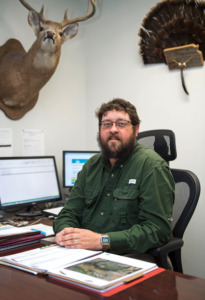By Angela Rogalski • Photo by Rory Doyle
Conservation is vital to the Mississippi Delta and the preservation of its land, which has some of the most fertile soil

in the world. Today, agricultural producers do have a resource for financial and technical assistance to help them with those conservation efforts by applying for assistance through the Environmental Quality Incentives Program. EQIP, which is a program offered through the USDA Natural Resources Conservation Services, helps farmers and other AG producers with conservation efforts that improve soil, water, plant, animal, air and other related natural resources on agricultural land.
Jason Makamson is Soil Conservationist in the Bolivar County Field office of the USDA Natural Resources Conservation Services. Makamson says that the financial assistance program can be a major boon to farmers and agriculturists.
“The Environmental Quality Incentives Program is a financial assistance resource for conservation projects. Generally, I would say 90 to 95 percent of our producers are cropland; row crop producers. But we do help with livestock producers too, but the majority used here in Bolivar County is for crop production.”
Makamson says that the conservation efforts that the program offers financial assistance for are varied.
“Putting in pipes and gulley’s, help with underground lines, doing land-leveling; just a variety of things such as that.”
The application process for the program is available year-round, however, NRCS establishes application “cut-off” or submission deadline dates for evaluation, ranking and approval of eligible applications.
“We take applications all year long,” Makamson says. “The farmer or the landowner can come in and apply at any time, and then the applications go through a ranking process, with a list of questions that have to be answered, which are national, state and local questions. And based on how those questions are answered, and depending upon the practices that are being applied for, the applications are given a ranking score. EQIP applications will be ranked based on a number of factors, including the environmental benefits and cost effectiveness of the proposal. Then we work down the list from top to bottom until we run out of funds.”
Makamson says that the benefits of the program are innumerable when it comes to optimizing conservation practices. “We’re here to help landowners with conservation. To help them conserve water; to help them prevent erosion; and to improve efficiency on the farm. I will say that our two major resource concerns here in Bolivar County are groundwater use, our reduction in groundwater use for irrigation, and sediment and nutrient runoff. So, anytime that we can implement practices that are going to reduce sediment and nutrient runoff and help us to irrigate more efficiently and reduce groundwater use, those are our two major resource concerns here that we want to address.”
He adds that generally most of the financial assistance programs are geared to cover 50 to 75 percent of the cost of installing implementation practices to help with these conservation efforts.
“Anyone that applies will be invested in the program too; it’s not 100 percent government paid for, so most of the farmers and landowners will have a vested interest as well. Many people see only the present farm improvements when these efforts are put into play, but ultimately these practices benefit all of us on a long-term basis. Anytime we can reduce the amount of groundwater being used for irrigation and when we can reduce the amount of sediment and nutrient runoff into our streams, that benefits us as a whole. These long-term benefits produce results. Most any of the projects that we do are long-term, permanent projects that are going to last for a long time.”
The program does offer only technical assistance as well. “If someone is looking for technical advice and they don’t necessarily need financial assistance, we offer that too,” he says. “We’re here to help in any way that we can. People just need to give us a call or come by our office.”
Farmers and landowners can apply at any USDA NRCS field office.
